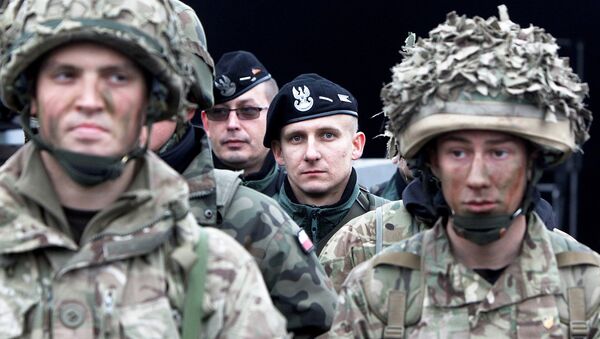As part of an ongoing NATO commitment to place troops and resources in the Baltics and Eastern Europe, the UK announced on January 20 that it would "commit nearly 1,000 personnel to NATO exercises taking place in Poland".
DefSec: We’re sending troops to Ex Anakonda & Swift Response, deploying HMS Iron Duke to Baltic region: joining forces to resist aggression.
— Ministry of Defence (@DefenceHQ) January 20, 2016
In a statement, it said:
"For Exercise Anakonda, the UK will commit a Battlegroup of around 800 military personnel. For Exercise Swift Response, the UK will commit 150 personnel to elements of a Brigade HQ, Battlegroup HQ and a Company."
Poland's Defense Minister Antoni Macierewicz told Radio Maryja on Friday that Poland and Britain had agreed that troops would stay in Poland permanently. It followed a meeting between UK Defense Secretary Michael Fallon and Macierewicz in Edinburgh, Scotland. Macierewicz said:
"One of the decisions, which resulted from yesterday's talks [is] a permanent presence of the British forces on Polish territory, that is 1,000 soldiers, who will permanently station on Polish territory from next year. They will switch around, it will be a rotational, but permanent presence of 1,000 soldiers."
London Denies Warsaw Claims
However, Sputnik News has confirmed with a source at the British Ministry of Defense that the 'permanent' deployment – even on a rotational basis – is incorrect. A source said the reports were false and that the UK was merely deploying for the purposes of NATO exercises.
Any permanent deployment of forces would be in breach of the Treaty on Conventional Armed Forces in Europe, signed in 1990 in Paris after the end of the Cold War signed by the member States of NATO and Russia which provided for the prevention of "any potentially threatening build-up of conventional forces in agreed regions of Europe, to include Central and Eastern Europe".
Warsaw has been keen on pushing for more NATO forces to be permanently deployed on its ground, but many western NATO members have been wary of breaching the terms of the Paris treaty.
Nonetheless, NATO has been in the habit of skirting the margins of the 'permanent' implication of the treaty by staging a long-running and rolling pattern of military exercises in the region.
Royal Navy's #HMSIronDuke joins #SNMG1 NATO Taskgroup heading for the Baltic @NATO_MARCOM https://t.co/6FrLYTuTeI pic.twitter.com/DHq9mnrZxt
— Royal Navy (@RoyalNavy) January 22, 2016
According to the UK Ministry of Defense: "The frigate HMS Iron Duke will visit Poland as part of NATO’s Standing Naval Maritime Group this summer. The helicopter carrier HMS Ocean will also participate in Exercise BALTOPS in the Baltic Sea over the summer and a Royal Navy minehunter is due to visit Poland in the autumn."
HMS Ocean, the @RoyalNavy Amphibious Assault Ship anchored at Greenwich opposite the old London Docks 2015. pic.twitter.com/dG2hhPMRbY
— River Thames (@ldnriverthames) January 12, 2016
It follows last year’s NATO deployment of forces for the Allied Rapid Reaction Corps (ARRC) which, in November, trained for the first time in the Baltic States.
NATO’s website claims: "The ARRC is one of the nine High Readiness Headquarters which can be quickly dispatched to lead NATO troops on missions within or beyond the territory of NATO member states."



